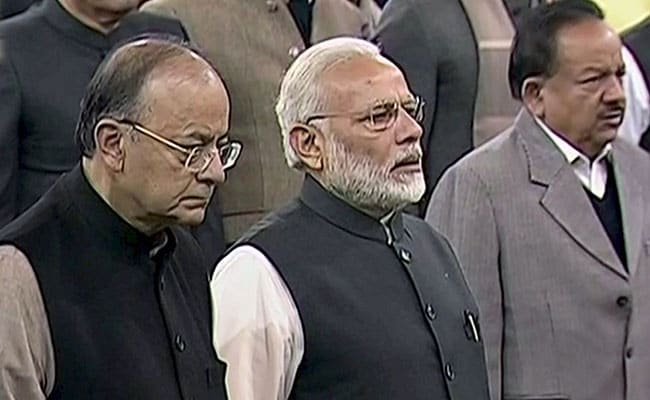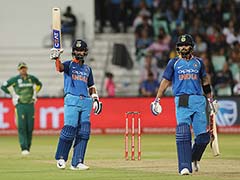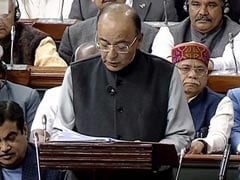He also announced plans to introduce "the world's largest government-funded health care programme", saying it would cover 50 crore of the country's poorest people, giving 10 crore families cover of Rs 5 lakh per family per year for secondary and tertiary care hospitalisation.
The minister also laid out plans to merge three public sector insurance companies and list the new entity. Spending in the year ending fiscal 2018-19 is projected to increase by 13.2 percent from the current year ending in March, with about three-fifths allocated to better infrastructure in the villages, where two-thirds of the country's 1.3 billion people live.
"This budget is farmer friendly, common citizen friendly, business environment friendly and development friendly. It will add to ease of living," Prime Minister Narendra Modi said after the budget announcement. Arun Jaitley said the spending in rural areas aimed at creating jobs and entrepreneurs, in addition to laying hundreds of thousands of miles of rural roads, building new houses, toilets, and providing electricity.
He made no changes in income tax slabs for individuals and increased cess on personal income tax and corporation tax to 4 per cent from the present 3 per cent. But he announced that all salaried people will get a standard deduction of Rs. 40,000 on their income in lieu of medical and transport reimbursements.
At press conference after the Budget Mr Jaitley said, "Step by step, in every budget, I have been putting surplus money in the hands of the middle-class taxpayer." During his presentation to parliament, Mr Jaitley switched from English to Hindi as he outlined schemes to promote agriculture, organic farming, animal husbandry and fisheries, ensuring that his message got through to rural communities.
The finance minister later told state-run TV Doordashan that the announcements had nothing to do with winning votes for the ruling BJP. Some analysts thought otherwise.
"It looks like that the BJP is aiming to shore up support among rural voters, there've been plenty of measures announced to boost the rural economy," said Shilan Shah, India economist, at Capital Economics in Singapore. "It was no surprise to us that they relaxed the deficit targets.".
The budget targeted a fiscal deficit of 3.3 percent of GDP in 2018/19, compared with expectations for a deficit of 3.2 percent. The 2018/19 deficit marks some slippage from a previous target of 3.0 percent for the year, and investors were also unnerved by the disclosure that this year's deficit was likely to come in at 3.5 percent, which was much higher than expected.
Unlike the bond market, analysts were un-alarmed.
Joy Rankothge, vice president at Moody's Investors Service, said the budget remained broadly in line with the government's fiscal consolidation path, and reinforced the credit rating agency's rationale for awarding India last November its first rating upgrade in 14 years.
The deficit numbers were too high for bond investors' taste as yields for India's benchmark 10-year bond rose as much as 17 basis points.
The share market also retreated following the imposition of a new tax on long term gains from stocks, though healthcare stocks rose thanks to the new health insurance progamme.
Regardless of the weaker markets, economists were in broad agreement that the budget should help foster economic growth. The economic survey released earlier this week laid out the government's expectations that India would soon become the world's fastest growing major economy.
The economy needs to grow over 8 percent annually to generate jobs for the hundreds of thousands of young people entering the labour market each year.
Mr Jaitley predicted growth would be above 8 percent soon, but for 2018/19, the economy was expected to expand by 7.2 percent, improving from 6.7 percent for the fiscal year ending this March, which was the weakest performance in three years.
This year's growth was slowed by the launch of a nationwide goods and service tax (GST) last year and a shock move to ban high value currency notes in late 2016.
"All-in-all, it was a business-as-usual budget for India and a great one for Bharat (rural India)," Amar Ambani, partner and head of research at IIFL in Mumbai. "The government did what it thought necessary to boost revenue, revive growth and get election-ready."
Main Opposition party the Congress has called it a "defeatist" budget and a "big letdown," with former finance minister P Chidambaram also saying, "I think they have thrown in the towel. It is a budget of a government which has conceded that it has failed to address key issues in the economy.
West Bengal Chief Minister Mamata Banerjee alleged that the budget is "anti-people."
"The BJP led government in Delhi is unfit to govern. It is a budget which is neither here, nor there. There is nothing new," she said.
(This story has not been edited by NDTV staff and is auto-generated from a syndicated feed.)





